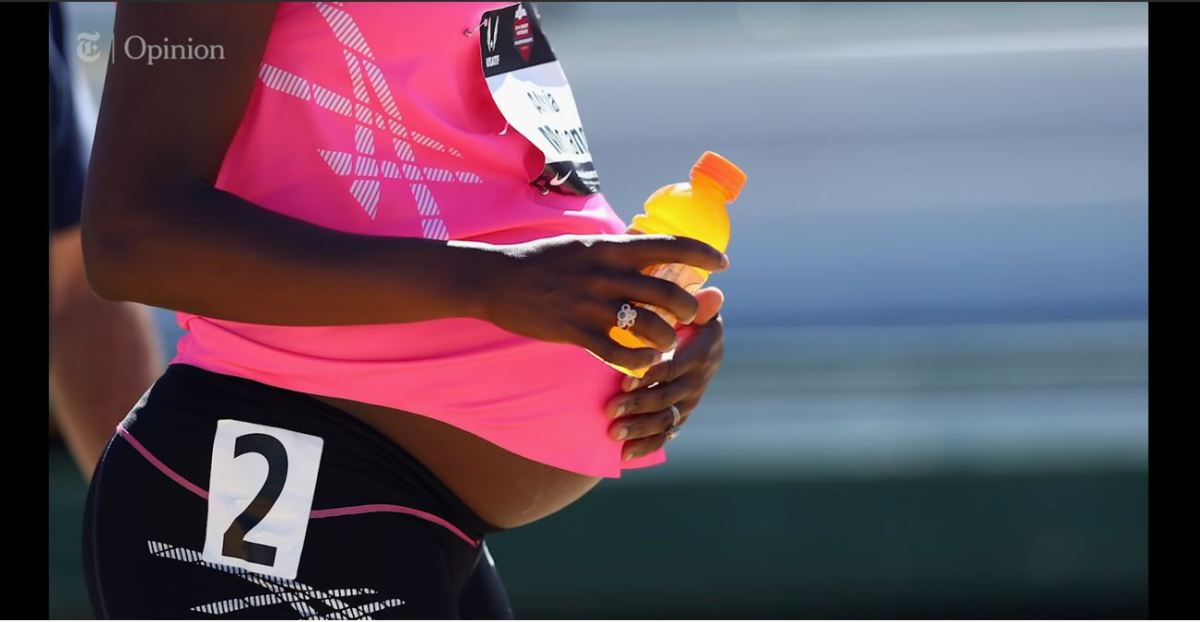Nike is at the forefront of progressive advertising, as evidenced by their incredibly popular “Dream Crazy” campaign. The sports giant went viral for their inspiring ads featuring the likes of Colin Kaepernick and Serena Williams encouraging viewers to dream big and “just do it.” Too bad they’re not extending this big dreaming to pregnant athletes.
They recently released a stirring Mother’s Day ad, “Dream With Us,” which was focused on female athletes culminating with the World Cup winning Women’s U.S. soccer team. Yet the same company that rallied behind a post-pregnancy Serena Williams has been treating their pregnant athletes like liabilities.
In a New York Times Opinion documentary, “What Nike Told Me When I Wanted to Have a Baby”, Olympic middle-distance runner and national champion Alysia Montaño details her experiences as a Nike-sponsored runner.
Montaño made headlines after running the 2014 United States Championships while eight months pregnant, earning her the moniker “the pregnant runner.” In the documentary, Montaño says, “The sports industry allows for men to have a full career. And when a woman decides to have a baby, it pushes women out at their prime.” When she told Nike she was pregnant, they responded “simple, we’ll just pause your contract and stop paying you.”
These policies are part of Nike’s contracts with track and field athletes, where they can reduce or suspend sponsorship pay “for any reason,” like a drop in world rankings or time off for maternity leave. This forces female athletes to remain competitive well into their pregnancy, and to resume training almost immediately after giving birth to ensure their livelihoods—at the risk of their own health and the health of their children.
Individual athletes do not make the same kind of money that team athletes do. With no league or union behind them, they often function as freelance contractors, where their sole source of income comes from endorsements and the occasional cash prizes from winning a race. Endorsements that are frequently reduced or suspended when female athletes become pregnant.
In addition to losing the support of Nike, pregnant athletes can also lose their health insurance provided by the U.S. Olympic committee and U.S.A. Track & Field, which can cancel an athletes insurance if they don’t stay in the top rankings during their pregnancy. Montaño left Nike for rival ASICS, who also allegedly threatened to stop paying her.
Montaño has since spearheaded maternity leave legislation to protect female athletes from losing their health insurance. In response, Nike issued a statement saying:
Nike responds to New York Times article about track stars who say their contracts were reduced with the company when they were pregnant. pic.twitter.com/kp64D51VWq
— Darren Rovell (@darrenrovell) May 13, 2019
This story is disheartening, but it is merely a symptom of a larger issue in America: our treatment of and lack of resources for working mothers. Out of 41 industrialized nations, the U.S. is the only one without mandatory paid maternity leave. In February, Sen. Kirsten Gillibrand and Rep. Rosa DeLauro introduced the FAMILY Act, which would guarantee 12 weeks of paid leave.
While other countries offer anywhere from 3 months or more of paid leave, the only federal protection in place for Americans is the Family and Medical Leave Act of 1993, which guarantees 12 weeks of unpaid job security for time off. Only six states (California, Rhode Island, New York, New Jersey, Washington, Massachusetts) and Washington, D.C. offer some version of paid family leave.
(via NY Times, image: NY Times)
Want more stories like this? Become a subscriber and support the site!
—The Mary Sue has a strict comment policy that forbids, but is not limited to, personal insults toward anyone, hate speech, and trolling.—










Published: May 14, 2019 04:13 pm